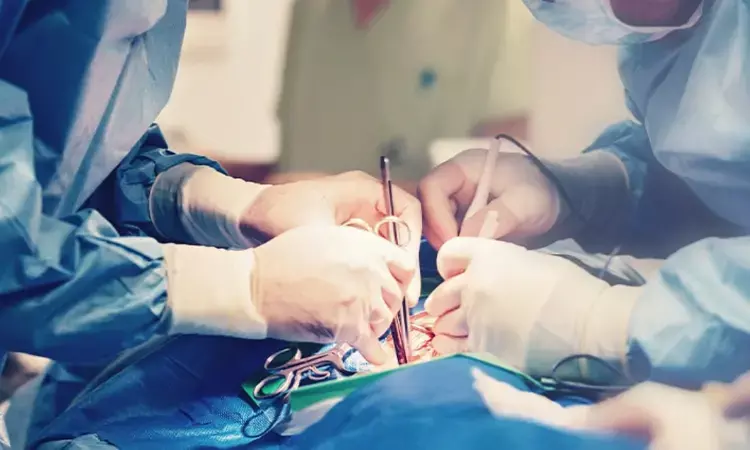- Home
- Medical news & Guidelines
- Anesthesiology
- Cardiology and CTVS
- Critical Care
- Dentistry
- Dermatology
- Diabetes and Endocrinology
- ENT
- Gastroenterology
- Medicine
- Nephrology
- Neurology
- Obstretics-Gynaecology
- Oncology
- Ophthalmology
- Orthopaedics
- Pediatrics-Neonatology
- Psychiatry
- Pulmonology
- Radiology
- Surgery
- Urology
- Laboratory Medicine
- Diet
- Nursing
- Paramedical
- Physiotherapy
- Health news
- Fact Check
- Bone Health Fact Check
- Brain Health Fact Check
- Cancer Related Fact Check
- Child Care Fact Check
- Dental and oral health fact check
- Diabetes and metabolic health fact check
- Diet and Nutrition Fact Check
- Eye and ENT Care Fact Check
- Fitness fact check
- Gut health fact check
- Heart health fact check
- Kidney health fact check
- Medical education fact check
- Men's health fact check
- Respiratory fact check
- Skin and hair care fact check
- Vaccine and Immunization fact check
- Women's health fact check
- AYUSH
- State News
- Andaman and Nicobar Islands
- Andhra Pradesh
- Arunachal Pradesh
- Assam
- Bihar
- Chandigarh
- Chattisgarh
- Dadra and Nagar Haveli
- Daman and Diu
- Delhi
- Goa
- Gujarat
- Haryana
- Himachal Pradesh
- Jammu & Kashmir
- Jharkhand
- Karnataka
- Kerala
- Ladakh
- Lakshadweep
- Madhya Pradesh
- Maharashtra
- Manipur
- Meghalaya
- Mizoram
- Nagaland
- Odisha
- Puducherry
- Punjab
- Rajasthan
- Sikkim
- Tamil Nadu
- Telangana
- Tripura
- Uttar Pradesh
- Uttrakhand
- West Bengal
- Medical Education
- Industry
Left atrial appendage occlusion during cardiac surgery prevents stroke in atrial fibrillation: LAAOS III trial

Canada: According to a recent study in the New England Journal of Medicine, concomitant left atrial appendage occlusion performed during cardiac surgery lowers the risk of ischemic stroke in atrial fibrillation patients.
Surgical occlusion of the left atrial appendage has been suggested to prevent ischemic stroke in patients with atrial fibrillation but has not been approved. The procedure can be performed during cardiac surgery undertaken for other reasons. Considering this, Richard P. Whitlock and the team conducted a multicenter, randomized trial. It included participants with atrial fibrillation and a CHA2DS2-VASc score of at least 2 (on a scale from 0 to 9, with higher scores indicating a greater risk of stroke) who were scheduled to undergo cardiac surgery for another indication.
The participants were randomly assigned to undergo or not undergo occlusion of the left atrial appendage during surgery; all the participants were expected to receive usual care, including oral anticoagulation, during follow-up. The primary outcome was the occurrence of ischemic stroke (including transient ischemic attack with positive neuroimaging) or systemic embolism.
The primary analysis population included 2379 participants in the occlusion group and 2391 in the no-occlusion group, with a mean age of 71 years and a mean CHA2DS2-VASc score of 4.2. They were followed for a mean of 3.8 years.
The study findings include:
- A total of 92.1% of the participants received the assigned procedure, and at 3 years, 76.8% of the participants continued to receive oral anticoagulation.
- Stroke or systemic embolism occurred in 4.8% participants in the occlusion group and 7.0% participants in the no-occlusion group (hazard ratio, 0.67).
- The incidence of perioperative bleeding, heart failure, or death did not differ significantly between the trial groups.
The researchers concluded that among participants with atrial fibrillation who had undergone cardiac surgery, most of whom continued to receive ongoing antithrombotic therapy, the risk of ischemic stroke or systemic embolism was lower with concomitant left atrial appendage occlusion performed during the surgery than without it.
Reference:
The study titled, "Left Atrial Appendage Occlusion during Cardiac Surgery to Prevent Stroke," is published in the New England Journal of Medicine.
DOI: https://www.nejm.org/doi/full/10.1056/NEJMoa2101897
Dr Kamal Kant Kohli-MBBS, DTCD- a chest specialist with more than 30 years of practice and a flair for writing clinical articles, Dr Kamal Kant Kohli joined Medical Dialogues as a Chief Editor of Medical News. Besides writing articles, as an editor, he proofreads and verifies all the medical content published on Medical Dialogues including those coming from journals, studies,medical conferences,guidelines etc. Email: drkohli@medicaldialogues.in. Contact no. 011-43720751


